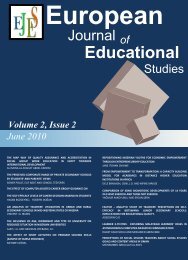emotional intelligence, self-efficacy, psychological well-being and ...
emotional intelligence, self-efficacy, psychological well-being and ...
emotional intelligence, self-efficacy, psychological well-being and ...
Create successful ePaper yourself
Turn your PDF publications into a flip-book with our unique Google optimized e-Paper software.
European Journal of Educational Studies 2(3), 2010<br />
Data Analysis<br />
Data collected were analyzed using hierarchical multiple regression analysis in order to establish the relationship of<br />
the independent variables (Happiness, life satisfaction, depression, <strong>self</strong>-<strong>efficacy</strong> <strong>and</strong> <strong>emotional</strong> <strong>intelligence</strong>) with the<br />
dependent variables (students’ behaviour <strong>and</strong> attitudes).<br />
RESULTS<br />
Correlation analyses<br />
Table 1 presents the descriptive statistics for the variable studied <strong>and</strong> the bivariate correlations <strong>emotional</strong> between<br />
<strong>intelligence</strong>, <strong>self</strong>-<strong>efficacy</strong>, happiness, life satisfaction, depression <strong>and</strong> students’ behaviours <strong>and</strong> attitudes (intrinsic<br />
motivation, <strong>self</strong>-discipline <strong>and</strong> respect for lecturers). The correlations on Table 1 showed that <strong>emotional</strong> <strong>intelligence</strong>,<br />
depression, <strong>self</strong>-<strong>efficacy</strong> <strong>and</strong> life satisfaction significantly correlated with intrinsic motivation, <strong>self</strong> discipline <strong>and</strong><br />
respect foe lecturers (correlations ranged from r= -.19 to r= .24, p< .05). Happiness significantly correlated with<br />
intrinsic motivation <strong>and</strong> respect for lecturers but not with <strong>self</strong> discipline. (See Table 1).<br />
Regression analyses<br />
A series of hierarchical regression analyses were conducted to examine the relative contributions of the predictor<br />
(independent) variables-<strong>emotional</strong> <strong>intelligence</strong>, <strong>self</strong>-<strong>efficacy</strong>, depression <strong>and</strong> life satisfaction to the prediction of<br />
students’ behaviours <strong>and</strong> attitudes- intrinsic motivation, <strong>self</strong>-discipline <strong>and</strong> respect for lecturers. Results are shown<br />
on Tables 2 <strong>and</strong> 3 in 3 models in accordance with the hypotheses. (See Table 2 <strong>and</strong> 3). It was hypothesised in H 1 that<br />
depression will predict students’ behaviours <strong>and</strong> attitudes. Results on Table 2 model1 showed that depression<br />
predicted intrinsic motivation (F (1,240) =9.70, R 2 =.23, Beta= -.12, p

















